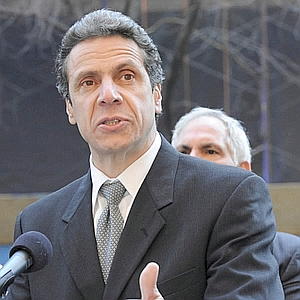by Joseph P. Tartaro | Executive Editor
The media, pollsters and political insiders suggest, if not openly claim, that New York’s Gov. Andrew Cuomo is invincible in his bid for reelection this year. They focus on his enormous campaign war chest but they seem to be discounting big gun rights opposition, especially away from New York City, where lawns are dotted almost everywhere with “Repeal the SAFE Act” yard signs. Cuomo, in case anyone needs telling, was the architect of the hasty and ill-conceived Secure Ammunition and Firearms Enforcement Act of January 2013.
They also seem to be discounting the many voters, especially among usually staunch Democrats, who have soured on the governor because of his policies on education, taxes, and environmental issues.
Now, Cuomo faces the prospect of a challenge from the left within the Democratic Party primary, even before he squares off against Republican Westchester County Executive Rob Astorino in November.
For those readers unfamiliar with the unusual New York election laws, I’ll summarize some points that may be strange to residents of two-party states.
In New York, there are many political parties in addition to the Big Two, and those minor parties can have an impact on either the Democrats or the Republicans, even though the Democrats have a big edge in voter enrollment. For instance, there are already the Conservative, Liberal, Independent and Green Parties, to name some of the better known camps. In addition, with the right number of petition signatures, you could even start a Gunowner Party or other party. If the gubernatorial candidate of the party-to-be gets at least 50,000 voters for governor in one election, it remains a viable party, which can nominate candidates for all elective offices during the next four years, or at least until the next gubernatorial election.
A candidate for any office can have as many party lines on the election ballot as he or she is able to win endorsements, and the winner of an election is the candidate who tallies the most votes from all lines.
So it is that Cuomo has the endorsement of other parties as well as the Democrat endorsement. Among the other parties endorsing Cuomo for reelection is the Working Families Party (WFP), which is further to the left than the Democrats and very strong in the New York City area particularly, which is where Cuomo’s big support is concentrated.
Cuomo was challenged for the WFP endorsement by Zephyr Teachout, a 42-year-old Fordham Law School professor and Brooklyn resident. It wasn’t an easy victory for Cuomo; Teachout got better than 40% of the WFP convention delegate support.
Now, instead of challenging Cuomo in the WPF primary, Teachout is going head to head with Cuomo in the September Democrat primary. Her running mate for the lieutenant governor’s office is Tim Wu, also a professor but at Columbia University.
The Teachout-Wu ticket recently turned in some 45,000 Democrat petition signatures, about three times the number needed to qualify for the primary ballot. Of course, this will mean that Cuomo’s lawyers will be spending a lot of his campaign funds to challenge Teachout’s signatures. However, it is unlikely that they can disqualify enough to block her ballot position.
“We’re quite ready,” Teachout said in a telephone interview with Gannett’s Albany Bureau. “We’re committed to running a serious campaign, and that means not just having the extra cushion, but being prepared for any legal challenges that may come.” Interestingly, some 600 of Teachout’s petition signatures came from the Buffalo Teacher’s Federation, normally Democratic candidate supporters, but then teachers are among those who have been unhappy with Cuomo for his education policies.
Then you have the civil service union workers who are far from Cuomo fans.
All of this suggests that Cuomo may have a tougher fight than the pollsters and the media suggest. Certainly, he will have to spend a lot of his campaign money first to disqualify Teachout’s candidacy, then to beat her in the primary.
This may mean he doesn’t have as much to attack Astorino and promote himself, which he is already doing statewide on television.
Teachout had moved to New York City five years ago to work at Fordham Law School, just meeting the residency requirement for a gubernatorial run. She grew up in rural Vermont before earning her undergraduate degree at Yale University and law degree at Duke University.
She has written extensively about political corruption and the role of money in politics. And while it’s her first run for office in New York, Teachout is hardly a political neophyte. She was the director of online organizing for former Vermont Gov. Howard Dean’s 2004 presidential campaign, helping create a model for rallying voters via the Internet.
Teachout’s campaign has largely focused on public corruption and economic issues, as well as public funding for schools. She hasn’t yet mentioned the SAFE Act. However, her running mate, Wu, has attacked Kathy Hochul, Cuomo’s running mate, for her pro-gun votes while a member of Congress.
There have been many signs of liberal discontent in New York over Cuomo’s four years. Now they have a candidate to vote for in the primary.
And if Cuomo wins his primary, one can wonder if the disaffected will vote for him in November, thus cutting some of the Democrat enrollment advantage against the Republican, Astorino. All in all, it’s shaping up to be a tougher race than Cuomo expected.
And Teachout isn’t the only Dem hoping to challenge Cuomo. Three others have submitted petitions in hopes of forcing a primary: comedian/ activist Randy Credico, chess expert Sam Sloan and Racquel McPherson.
The old proverb about “the enemy of my enemy is my friend” will also come into play in New York this year. Stay tuned.



